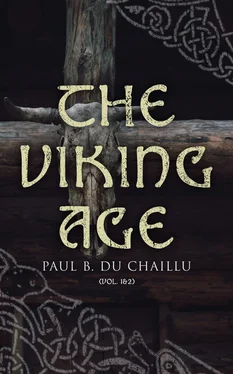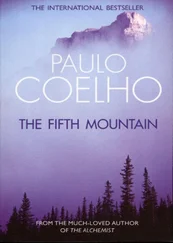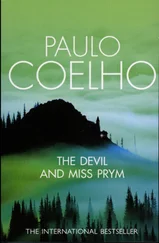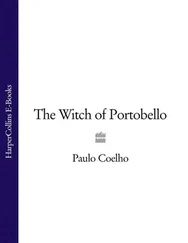“There was a king named Godmund in Jötunheim; his farm was called Grund, and the herad (district) in which it was situated Glæsisvellir. He was a powerful man and old, as well as all his men, and lived for so many generations that people believed Odains Akr (the land of the undying) to be in his realm. The place is so healthy that sickness and old age vanish from every man who comes there, and nobody can die there. It is said that after the death of Godmund, men worshipped him and called him their god. King Godmund had a son, Höfund, a seer and a wise man; he was made judge over all the adjoining lands; he never gave a wrong judgment; nobody dared or needed to doubt his judgment” (Hervara Saga, c. 1).
“Thórólf Smjör (butter, because he said Iceland was so fertile that butter dripped from every blade of grass) was the son of Thorstein Skrofa, son of Grim, who was worshipped after his death on account of his popularity and called Kamban” (Landnama i., ch. 14).
Animal Worship. —The worship of animals and birds seems to have sometimes taken place.
Once some men went to Eystein and told him that a large host had come into his realm so hard to deal with that it had devastated all the land, and left no house standing.
“When Eystein heard these tidings he thought he knew who these vikings were. He sent an arrow-message all over his realm and summoned all who were willing to help him and could wield a shield. ‘Let us take with us the cow Sibilja, our god, and let her run in front, and I believe that, as before, they will not be able to stand her bellowing. I urge you all to valiantly drive away this large and evil host.’ This was done, and Sibilja let loose; Ivar saw her coming, and heard her fierce bellowing; he bade all the host make a great noise both with weapons and war-cries, lest they should hear the voice of the evil beast which went against them. Ivar told his hearers to carry him forward as far as they could, and when the cow came at them to throw him on her, and then either he or she should die; and to take a large tree and cut it into the form of a bow, and also bring him arrows; this strong bow was now brought, and the large arrows he had ordered, which were not manageable by any other. Ivar then urged every one to do his best. Their host went onward with great rushing and tumult, and Ivar was carried in front of their ranks. The bellowing of Sibilja sounded so loud that they heard it as well as if they had been silent and stood still; they were so startled that all, except the brothers, wanted to fight among themselves. When this wonder was going on, those who carried Ivar saw that he drew his bow as if it were a weak elm twig, and they thought he was going to draw his arrows beyond the point. 275They heard his bowstring sound louder than they had ever heard before; they saw that his arrows flew as swiftly as if he had shot with the strongest cross-bow, and so straight that one arrow went into each eye of Sibilja; and she stumbled and fell down on her head, and her bellowing was much more than before. When she came at them he bid them to throw him on her, and he was as light to them as a little child, for they were not very near to the cow when they threw him; he came down on the back of Sibilja, and became as heavy as if a rock fell on her, and every bone in her was broken and she was killed.
“Although the sons of Ragnar were valiant, they could not stand both an overwhelming force of men and witchcraft; nevertheless they made a stout resistance, and fought like warriors with great renown. Eirik and Agnar were in the front that day, and often went through the ranks of King Eystein, but Agnar fell” (Ragnar Lodbrok’s Saga).
“King Olaf was at a feast in Ögvaldsnes. One evening there came to the farm an old man, very wise in talk, one-eyed, with a hood low down over his face; he could tell of every country. He began to talk with the king, who liked it very much and asked about many things, but he was able to answer any question, and the king did not go to bed for a long time that night. Then the king asked if he knew who Ögvald was, after whom the bœr and the ness (cape) were named. The guest said he had been a king and a great warrior, and had worshipped a cow more than anything else, and taken it with him wherever he went, as he thought it wholesome to drink its milk. Ögvald fought against a king called Varin, and fell in the battle; he was mounded there a short way from the bœr and the bautastones raised, which stand there still. In another place near to this bœr the cow was mounded ” (Olaf Tryggvason’s Saga, c. 71).
“Floki Vilgerdarson, a great Viking, made himself ready in Rogaland to search for Snow-land (Iceland). He made a large sacrifice to the three ravens, which were to show him the way. They sailed to the Faroes, and then put to sea with the three ravens, to which sacrifice had been made in Norway; when the first was let loose it flew in the direction of the stern; the second rose into the air, and came back to the ship; the third flew in front of the prow in the direction in which they found the land.
“They landed at the place called Vatnsfjord, in Breidifjord. The fjord was so full of fish that they neglected to gather hay on account of the fishing, and during the winter therefore all their cattle died. The spring was rather cold there, and Floki went up on a mountain on the north side of the fjord, and on the other side saw a fjord filled with ice. Therefore they called the land Iceland” (Landnama i., c. 2).
Natural objects, such as groves and the sacrificing stone, were worshipped, and no one was allowed to look at Helgafell (a holy mountain) before he had washed himself in the morning, and no cattle were to be killed there.
“Eyvind, the son of Lodin, settled in the valley of Flatey (his land extending) as far as Gunnsteinar (Gunn-rocks), which he worshipped.”
“Thorir Snepil took up the whole of Fnjóskadal to Odeila, and dwelt at Lund (grove); he worshipped the grove” (Landnama iii., ch. 17).
“Hord’s brother-in-law Indridi wished to slay the bondi Thorstein Gullknapr (gold-button), and waited for him on the way to his sacrificing house, whither he was wont to go. When Thorstein came, he entered the sacrificing house and fell on his face before the stone he worshipped, which stood there, and then he spoke to it. Indridi stood outside the house; he heard this sung in the stone:—
Thou hast hither
For the last time
With death-fated feet
Trodden the ground;
Before the sun shines,
The hard Indridi
Will justly reward thee
For thy evil doings.
“Thorstein went out and home; Indridi distinctly saw him going, and told him not to run so fast. He went in front of him, and at once struck him with the sword of Soti under the chin so that his head flew off” (Hörd’s Saga, c. 37).
“On the ness stands a mountain, which he (Thórólf Mostrarskegg) held in such reverence that no one was allowed to look on it unwashed, and nothing was to be killed on it, neither men nor cattle. He called it Helgafell (holy mountain), and he believed he would go thither when he died, as well as all his kinsmen on the ness. On the point at which Thor had landed he made the place for all judgments, and there established a herad-thing (a Thing for the district). This place was so holy that he would not allow the field to be defiled in any manner” (Eyrbyggja, c. 4).
Fire seems to have been looked upon as holy; and it was sometimes the practice to ride round the land with fire, or to throw a burning arrow, so as to signify ownership.
“Jörund godi (temple-priest), son of Hrafn Heimski, settled west of Fljót, where it is now called Svertingsstadir; there he raised a large temple. A small piece of land lay unsettled east of Fljót, between Krossá (river) and Jöldustein; Jörund went with fire around this, and made it the property of the temple” (Landnama v., c. 3).
Читать дальше












